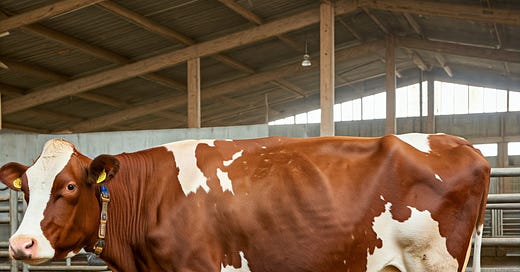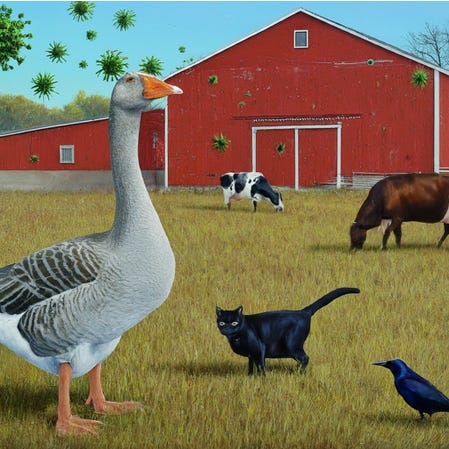Health Warning: Bird Flu Detected in Raw Milk from Fresno Dairy
Voluntary recall at the state’s request with a Best By date of 11/27/2024.
The California Department of Public Health (CDPH) has issued a warning to the public to avoid consuming a specific batch of cream-top whole raw milk produced and packaged by Raw Farm, LLC of Fresno County, following the detection of the bird flu virus in a retail sample. Unlike most states, California is proactively testing for the H5N1 avian flu virus, highlighting its commitment to tracking this dangerous pathogen. H5N1 poses a significant public health threat primarily due to its potential to evolve into forms better suited for human infection or even human-to-human transmission, as seen in past pandemics.
Historically, H5N1 has had an alarming mortality rate of approximately 50%. Fortunately, the cow-adapted variant circulating now has not shown the same severity. However, evolution is unpredictable, and a single genetic leap could dramatically alter the situation. Limiting human infections is critical because every transmission gives the virus an opportunity to mutate. This is particularly concerning for individuals with weakened immune systems, such as newborns, older adults, pregnant women, or those with compromised immunity, as these populations provide fertile ground for viral evolution and severe illness. As of November 22, 2024, the H5N1 avian influenza virus has been confirmed in 616 dairy herds across 15 U.S. states with 55 confirmed human cases. Vigilance and prevention are key to mitigating this risk.
Raw Milk Recall Highlights Public Health Risks
In a recent precautionary move, Raw Farm, LLC issued a voluntary recall of its raw milk product at the request of California health authorities. The affected lot, code 20241109, has a "Best By" date of 11/27/2024. Consumers who have this product should return it to the store of purchase immediately. Pasteurized milk, by contrast, remains a safe and reliable option. California public health will increase the testing to twice a week at this facility.
This recall underscores long-standing warnings from public health experts about the risks of consuming raw milk and raw milk products. Unlike pasteurized milk, which undergoes a heating process to kill harmful bacteria and viruses, raw milk carries a heightened risk of foodborne illness. Outbreaks involving pathogens like Salmonella, Listeria monocytogenes, toxin-producing E. coli, Brucella, and Campylobacter have all been linked to raw dairy products. Even viruses such as avian flu can be transmitted through raw milk.
How Bird Flu Spreads From Infected Dairy Cows
The spread of H5N1 through infected cows and their milk can occur in several ways, including:
Touching the eyes, nose, or mouth with unwashed hands after handling raw milk from an infected cow or contaminated surfaces.
Exposure of raw milk to the eyes, nose, or mouth, either directly or through splashing.
Drinking raw milk from a cow infected with the bird flu virus.
California's proactive measures, including monitoring for H5N1 and encouraging safe food practices, play a vital role in preventing the spread of this dangerous pathogen. It would be great if all states were taking these measures. Choosing pasteurized milk and staying informed about public health advisories are simple yet powerful ways consumers can protect themselves and their families.
For further updates, refer to the California Department of Public Health.
Symptoms in Humans, Cows, Poultry, and Wild Birds
Symptoms of H5N1 in Humans
While infection is relatively rare in humans, it's essential to be aware of the symptoms:
Common:
Fever and chills
Cough
Sore throat
Muscle aches
Eye redness /Conjunctivitis/ Pink eye
Note: Keep in mind that bacterial conjunctivitis is frequently seen in only one eye and generally has thicker eye discharge, while viral conjunctivitis often affects both eyes symmetrically with thinner, more watery discharge.
Runny or stuffy nose
Headaches
Fatigue
Difficulty breathing/shortness of breath
Diarrhea
Nausea
Vomiting
Severe Complications
Pneumonia
Acute respiratory distress syndrome
Neurological symptoms (confusion, seizures)
Symptoms in Dairy Cows
Decreased lactation
Low appetite
Symptoms in poultry (chickens, turkeys)
Sudden death of bird with no clinical symptoms
Lack of energy
Inappetence
Swelling of the head, comb, eyelid, wattles, and hocks
Discoloration of wattles, combs, and legs
Nasal discharge
Coughing
Sneezing
Neurological signs (incoordination)
Diarrhea
Symptoms in Wild Birds
Neurological signs (incoordination, swimming in circles, weak)
Sudden death
Symptoms in Cats
Respiratory symptoms (coughing, sneezing)
Neurological signs (seizures, paralysis), or a combination of both.
The infection can be fatal.
Pet Owners
Pet owners need to be aware that dogs and cats can contract bird flu, particularly if they come into contact with infected birds or their droppings. While the risk of you catching bird flu directly from your pet is low, it's still a possibility. For instance, a veterinarian in New York City contracted a mild form of bird flu (influenza A(H7N2) virus) in 2016 after treating sick cats without protective gear. (3)
Treatment of Humans
Antiviral Medications: Early treatment with antiviral medications (such as oseltamivir or zanamivir) is crucial to reduce the severity of illness and prevent complications. These medications may also be given as a preventative measure to those in close contact with infected birds or people.
The historical problem has been that doctors do not identify the virus fast enough, resulting in more severe symptoms and death. Reports of severe avian influenza A(H5N1) illness in humans have included fulminant pneumonia leading to respiratory failure, acute respiratory distress syndrome, septic shock, and death.
Earlier Articles on H5N1:
Avian Influenza A (H5N1) in Cats, Cows, and Humans: Symptoms, Timeline, Antiviral Therapies, and Vaccine Development - A Comprehensive Review
H5N1 Avian Influenza: A Critical Update
The Perfect Storm: H5N1 Avian Influenza and COVID-19 Coinfections
In a recent study, published on May 27, 2024, the researchers report a human case with a co-infection with the clade 2.3.4.4b avian influenza A H5N1 virus and COVID-19. This case involved an elderly female farmer with multiple comorbidities who had a history of SARS-CoV-2 infection. This patient tested positive for COVID-19 on December 20, 2022, before …
📛Huge Loop Hole! Dairy Cows to Hamburgers: How H5N1 Could Enter the Meat Market Without Testing
There are now 51 herds across 9 states identified with confirmed H5N1. We now know that both beef and dairy cows have human and bird receptors for H5N1. This means that cows can help facilitate the virus’s evolution to infect people more easily.
Update: As of November 22, 2024, the H5N1 avian influenza virus has been confirmed in 616 dairy herds across 15 U.S. states with 55 confirmed human cases.
The Race Against Time: Stopping H5N1 Before Human to Human Transmission. Is Your Steak Safe? The H5N1 Threat Explained
If there is a possibility of preventing a pandemic, every conceivable effort must be made to avert the catastrophic consequences that could follow. Pandemics not only cause widespread illness and death but also bring about untold suffering and profound economic loss. The impact on public health can be devastating, overwhelming healthcare systems, and leading to a high mortality rate, particularly among the most vulnerable populations. The ripple effects extend far beyond the immediate health crisis, affecting mental health, social stability, and overall quality of life. Preventing a pandemic is not just a matter of public health—it is a moral imperative to protect human life and dignity. We should have already learned this lesson from COVID-19 but clearly, our governments and public health agencies haven’t learned it yet.










Great article. Thank you! Two questions: 1. Do you have an updated timeline on how this has developed since your 4/7 article? I've been watching this roll out since March. I found the timeline of 4/7 so helpful. There's been so many further developments like with the pig in Washington and the very sick teenager in Canada. It would be great if you could continue it. 2. Do you have any further information on pasteurization techniques? I was reading somewhere that there are two techniques, one is much better at killing viruses than the other. I get nervous about the pasteurization because when health and industry officials talk about pasteurization they say things like it "can" kill the virus and that risks are low instead of saying that it "does" kill the virus. Thanks!
What kind of fool drinks raw milk? Pasteurisation was invented to end the problems caused by raw milk.